|
|
|
Sort Order |
|
|
|
Items / Page
|
|
|
|
|
|
|
| Srl | Item |
| 1 |
ID:
117411
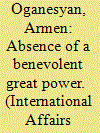

|
|
|
|
|
| Publication |
2012.
|
| Summary/Abstract |
AMERICAN AUTHOR Anne O'Hare McCormick (1880-1954), whose life experience was interwoven with both world wars, packaged into a single phrase the lessons to be derived from the tumultuous epochs when she famously wrote: "Today the real test of power is not capacity to make war but the capacity to prevent it."
|
|
|
|
|
|
|
|
|
|
|
|
|
|
|
|
| 2 |
ID:
165875
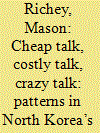

|
|
|
|
|
| Summary/Abstract |
This article examines the patterns in the Democratic People’s Republic of Korea’s (North Korea’s) use of hostile rhetoric in its internationally-directed messaging. The article first places North Korea’s belligerent rhetoric in the context of that country’s capacity to threaten the US and its Northeast Asian allies; indeed many analysts worry that Pyongyang’s rhetoric represents a conflict escalation risk or even a casus belli. Following this, the article discusses the common explanations – irrationality/incompetence, lack of audience costs, inter alia – for why the North Korean regime employs such hostile rhetoric, and finds these explanations wrong or misleading. The main analysis section describes the results of a study of 10 years of English-language propaganda published by the KCNA (North Korea’s state news agency). A multiple regression model is used to test the relationship between North Korea’s hostile rhetoric and a set of independent variables. The statistical tests indicate a mixed correlation of North Korean rhetoric to the independent variables. One major finding is that there is no correlation between hostile North Korean rhetoric and the country’s kinetic provocations. The conclusion discusses the role that North Korea’s rhetoric plays within the country’s larger adversarial relationship to the US, South Korea, and Japan.
|
|
|
|
|
|
|
|
|
|
|
|
|
|
|
|
| 3 |
ID:
120874
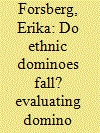

|
|
|
|
|
| Publication |
2013.
|
| Summary/Abstract |
There is a commonly expressed concern that granting territorial concessions to separatist groups may create "domino effects." However, although this statement is largely undisputed within political rhetoric, no firm conclusions have been provided in previous research. The purpose of this study is to systematically examine whether the granting of territorial concessions to an ethnic group does indeed spur new separatist conflicts. I suggest that such domino effects may be generated by two processes. First, the accommodation of an ethnic group's separatist demands may trigger a general inspiration process among other groups within and across borders. Second, by acquiescing to separatist demands, a government signals that it may also yield to the demands of other groups it confronts, making it more likely that other groups choose to pursue secessionism. Statistical analysis of data on territorial concessions globally 1989-2004 provides no evidence of domino effects. This holds true both within and across borders.
|
|
|
|
|
|
|
|
|
|
|
|
|
|
|
|
| 4 |
ID:
177181
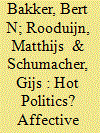

|
|
|
|
|
| Summary/Abstract |
Canonical theories of opinion formation attribute an important role to affect. But how and for whom affect matters is theoretically underdeveloped. We establish the circumplex model in political science as a theory of core affect. In this theory unconscious emotional processes vary in level (arousal, measured with skin conductance) and direction (valence, measured with facial electromyography). We theorize that knowledge, attitude extremity, and (in)congruence with political rhetoric explain variation in affective responses. In a large lab study (N = 397), participants watched video clips with left-wing or right-wing rhetoric on prominent issues. We find that people with extreme attitudes experience more arousal in response to political rhetoric and that political rhetoric incongruent with prior attitudes evokes negative affect. Moreover, we show that affective responses lead to opinion change, independent of self-reported emotions. We conclude by setting a research agenda for the alignment between affective and cognitive components of emotions and their consequences.
|
|
|
|
|
|
|
|
|
|
|
|
|
|
|
|
| 5 |
ID:
108319
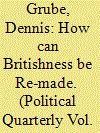

|
|
|
|
|
| Publication |
2011.
|
| Summary/Abstract |
Modern Britishness is widely seen to be based on shared values like 'fair play', 'tolerance', and respect for 'diversity'. Can such a 'values-based Britishness' be effective as a national binding agent in an era of devolution and globalisation? The idea that a uniquely 'British' character is based on shared values of some kind is not new. The contemporary debate is framed by decisions made over a century ago in the Victorian era-when the decisive shift occurred from a British identity based on religious difference to one based on shared moral values. Through political rhetoric, legislation, and the courts, Victorian governments shaped and changed the character of Britishness. The same tools remain available to contemporary lawmakers in shaping a twenty-first century Britishness that embraces modern universal values, but also defines some more uniquely British emotional connection points around which national identity can be built.
|
|
|
|
|
|
|
|
|
|
|
|
|
|
|
|
| 6 |
ID:
132470
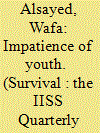

|
|
|
|
|
| Publication |
2014.
|
| Summary/Abstract |
Youth movements in the Gulf have been effective but ephemeral, sometimes manipulated by established groups or succumbing to social divisions.
In October 2012, thousands of citizens took to the streets of Kuwait City to protest an emergency decree by the emir that amended the country's electoral law in such a way as to undermine the position of the opposition within parliament. The demonstrations were unprecedented both in size and political rhetoric. An estimated 50,000 people addressed the ruler with slogans such as 'we will not let you'. Security forces used tear gas and stun grenades to break up the gatherings. Youth groups formed the backbone of the movement's leadership (at least initially) and supplied much of its rank and file. However, within months, this vibrant and defiant campaign had largely dissipated. Having failed to attain its goals, it was unable to maintain a permanent political presence. Throughout the Gulf region, other youth-led movements have suffered a similar fate. Once groups achieve their original goals or lose their initial momentum due to government resistance, they soon break down, often disappearing altogether from the political scene.
|
|
|
|
|
|
|
|
|
|
|
|
|
|
|
|
| 7 |
ID:
187564
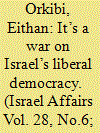

|
|
|
|
|
| Summary/Abstract |
This article examines the discourse of the Israeli Left in the years preceding the succession of general elections in 2019–21, with a focus on claims of the purported threats to democracy presented by the right-wing government. Rhetorical analysis of opinion pieces and political commentary in the press on issues relating to education, science, and culture shows recurrent use of appeals to fear – such as comparisons with totalitarian regimes and invocation of other dystopian spectres resulting from nationalist indoctrination and processes of ‘religionization’. This article defines the appeal to fear and other forms of the Left’s identity claims making during this period as moral panic discourse, around which the Left sought to revive its relevance in the public debate at a time when it was viewed as a marginal political force in ideological decline. The article’s main argument is that while the labelling of the Right as a ‘danger to democracy’ has been entrenched in leftist discourse since the 1977 ‘Upheaval’, during the period in discussion it became the principal – almost sole – theme in leftist publicist discourse, serving as a flag issue around which the Left reorganised its identity as the ‘democratic camp’.
|
|
|
|
|
|
|
|
|
|
|
|
|
|
|
|
| 8 |
ID:
146529
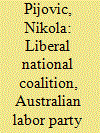

|
|
|
|
|
| Summary/Abstract |
The issue of bipartisanship in Australian foreign policy is not often substantially addressed. The country’s relations with the world appear to exhibit strong continuity regardless of the political party in government. And yet, when it comes to engagement with African states and issues, the last two decades have seen highly prominent partisan differences in Australian foreign policy. This article utilises the example of Australia’s foreign policy engagement with Africa to argue that there may be two levels of understanding bipartisanship in Australian foreign policy. On the one hand, aimed at relationships and issues perceived to be of primal and significant security and economic well-being for the country, Australian foreign policy does indeed appear to be bipartisan. However, aimed at relationships and issues that have traditionally been perceived as holding minimal security and economic interest and importance for the country, Australian foreign policy does exhibit partisanship.
|
|
|
|
|
|
|
|
|
|
|
|
|
|
|
|
| 9 |
ID:
155175
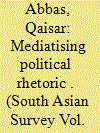

|
|
|
|
|
| Summary/Abstract |
The mediatisation of politics has been a dominant theory in the field of political
communication for some time, proposing that the mass media in democratic
societies tend to dominate the political process. This research intends to explore
the media-politics nexus as part of the protest campaign in 2014 in Pakistan,
also known as the long march. Specifically, it analyses dynamics of the political
rhetoric of protesting leaders and dimensions of the two selected TV talk shows.
Using textual analysis as research methodology, this article concludes that by
transforming the political theatre into a media theatre, the talk shows effectively
mediatised the long march. TV news became part of the political process, rather
than covering it objectively, either by supporting or opposing the long march.
The two top political leaders of the long march voluntarily adopted media logic
as a rhetorical strategy to offer a readymade product for media coverage.
|
|
|
|
|
|
|
|
|
|
|
|
|
|
|
|
| 10 |
ID:
132944
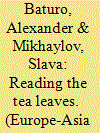

|
|
|
|
|
| Publication |
2014.
|
| Summary/Abstract |
In the absence of public information on the inner workings of the Russian political regime, especially during Medvedev's presidency, outside observers often have to rely on politicians' unguarded comments or subjective analysis. Instead, we turn to quantitative text analysis of political rhetoric. Treating governors as a quasi-expert panel, we argue that policy positions revealed in regional legislative addresses explain how elites perceived the distribution of power between Putin and Medvedev. We find that governors moved from a neutral position in 2009 to a clearly pro-Putin position in 2011, and that policy initiatives advocated by Medvedev all but evaporated from the rhetoric of governors in 2012.
|
|
|
|
|
|
|
|
|
|
|
|
|
|
|
|
| 11 |
ID:
179297
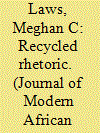

|
|
|
|
|
| Summary/Abstract |
Seen as one of Africa's most visionary and enlightened autocrats, Paul Kagame's presidency is often contrasted with the violence and ethnocentrism of his discredited predecessors. Drawing on rarely analysed primary sources, this article disputes this simplified narrative by revealing striking continuities in the ruling elite's rhetorical repertoire in the late colonial period (1956–1959) and present-day Rwanda. Both then and now, rhetorical calls to remove ethnic labels from public discourse in the name of national unity are key resilience strategies designed to shape regime relations with domestic and international audiences in ways that reinforce power concentration by a small (largely Tutsi) elite. Changes in the distribution of power and the scale of anti-Tutsi violence (most notably in 1994) help explain why a similar rhetorical strategy failed to prevent the dismantling of the Tutsi oligarchy in 1961 while strengthening its contemporary counterpart.
|
|
|
|
|
|
|
|
|
|
|
|
|
|
|
|
| 12 |
ID:
119119
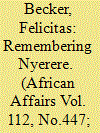

|
|
|
|
|
| Publication |
2013.
|
| Summary/Abstract |
This article examines the changing uses of political rhetoric around the burial of Julius Nyerere in 1999. It argues that the ruling party uses rhetoric as a means of 'soft power', but also documents how this rhetoric, though geared towards legitimizing Nyerere's successors, employed tropes that were rejected by some people and were used by others to critique leaders who were perceived to lack the selfless integrity attributed to Nyerere. The article compares funerary songs by a government-sponsored band, popular at the time of Nyerere's death, with memories of Nyerere in rural areas in the early to mid-2000s. While the image of Nyerere in the funeral songs as a benign family patriarch writ large still persists, it coexists with strongly divergent constructions of Nyerere as an authoritarian ruler or a self-seeking profiteer. Moreover, the 'official', benign Nyerere has been employed not only by government and party faithful, but also by striking workers, opposition politicians, and critical newspapers as a measure of the shortcomings of his successors. The invocation of Nyerere as a paragon of an endangered ideal of virtue in public office indicates widespread anxieties towards a state that often disappoints but occasionally delivers, in unpredictable turns, and the limits of the government's ability to shut down dissent.
|
|
|
|
|
|
|
|
|
|
|
|
|
|
|
|
| 13 |
ID:
172363
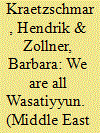

|
|
|
|
|
| Summary/Abstract |
This article focuses on a common rhetorical referent in Egyptian public imagery and parlance–that of wasat (center) and its derivatives, wasati/wasatiyya (centrist/centrism)–and discusses how it has been appropriated and molded in the sphere of party politics. Inductive in approach, it examines the rhetorical appropriations of the center ground by party officials, revealing not only its popularity as a marker of (ideological) self-positioning but its malleability and contextuality. The article concludes that in Egyptian party politics the center positioning of parties cannot be gauged exclusively from the study of party manifestos and/or expert surveys, but ought to include contextual analysis of how this and other ideological markers are appropriated and given meaning in elite rhetoric.
|
|
|
|
|
|
|
|
|
|
|
|
|
|
|
|
|
|
|
|
|